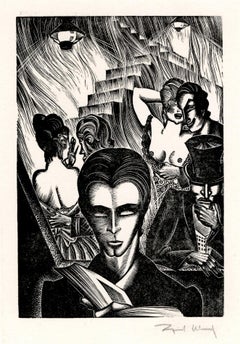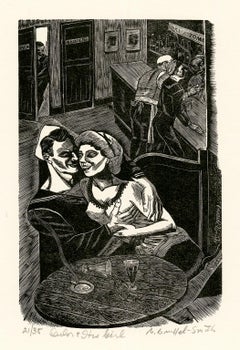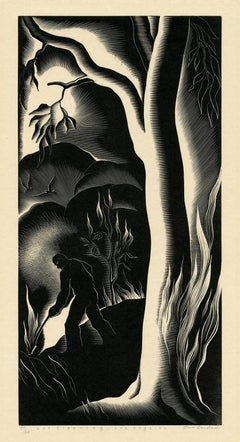Want more images or videos?
Request additional images or videos from the seller
1 of 3
Jacques La Grange'After the Start' — America's Cup, 18931934
1934
Price:$560
About the Item
- Creator:Jacques La Grange (1895)
- Creation Year:1934
- Dimensions:Height: 9.63 in (24.47 cm)Width: 12.13 in (30.82 cm)
- Medium:
- Movement & Style:
- Period:
- Condition:
- Gallery Location:Myrtle Beach, SC
- Reference Number:Seller: 1040031stDibs: LU53239326382
About the Seller
5.0
Recognized Seller
These prestigious sellers are industry leaders and represent the highest echelon for item quality and design.
Platinum Seller
Premium sellers with a 4.7+ rating and 24-hour response times
Established in 1995
1stDibs seller since 2016
334 sales on 1stDibs
Typical response time: 1 hour
Associations
International Fine Print Dealers Association
Authenticity Guarantee
In the unlikely event there’s an issue with an item’s authenticity, contact us within 1 year for a full refund. DetailsMoney-Back Guarantee
If your item is not as described, is damaged in transit, or does not arrive, contact us within 7 days for a full refund. Details24-Hour Cancellation
You have a 24-hour grace period in which to reconsider your purchase, with no questions asked.Vetted Professional Sellers
Our world-class sellers must adhere to strict standards for service and quality, maintaining the integrity of our listings.Price-Match Guarantee
If you find that a seller listed the same item for a lower price elsewhere, we’ll match it.Trusted Global Delivery
Our best-in-class carrier network provides specialized shipping options worldwide, including custom delivery.You May Also Like
Modern American Industrial Landscape
Located in Buffalo, NY
An original woodblock print dated 1965, titled "Our Town" but signed illegibly.
Category
1960s American Modern Figurative Prints
Materials
Paper, Woodcut
Nude and Swan
Located in New York, NY
Woodcut on paper, 1921. Signed by the artist, numbered 13/24, dated, titled "Lead'r" and dedicated "To Rose - Nat - be careful" in pencil, lower margin.
The dedicatees named by E...
Category
1920s American Modern Figurative Prints
Materials
Woodcut
By Night On My Bed
Located in New York, NY
Woodcut. Signed by the artist and dated in pencil, lower right. Titled in pencil, lower left, and numbered "28" in pencil, lower center.
This woodcut was made by Esherick to ill...
Category
1920s American Modern Figurative Prints
Materials
Woodcut
John E. Billmyer, Flower Piece, WPA wood engraving
Located in New York, NY
'Flower Piece' shows the artist, John Billmyer, to be a highly accomplished wood engraver. There are endless patterns and created details -- all executed flawlessly. Mostly made up o...
Category
Mid-20th Century American Modern Figurative Prints
Materials
Woodcut
Walter DuBois Richards, The Lobster Float
By Walter DuBois Richards
Located in New York, NY
Ohio-born Walter DuBois Richards (1907-2006) was educated at the Cleveland School of Art. He re-located to New York around 1933 where he had a successful career as a commercial artis...
Category
1930s American Modern Landscape Prints
Materials
Woodcut
Oscar Weissbuch, Westchester Hills (NY), New Deal, WPA-era wood engraving
Located in New York, NY
New York City native Oscar Weissbuch (1904-1948), attended the Yale University School of Fine Arts and the Art Students League, NY. He participated in the NYC-WPA printmaking project...
Category
1930s American Modern Landscape Prints
Materials
Woodcut
Letterio Calapai, (Sky Abstraction), 1957, mid-century wood engraving
By Letterio Calapai
Located in New York, NY
Letterio Calapai is widely recognized as a major American artist of the twentieth century. He is widely respected as a printmaker, especially for engravings and wood engravings, and ...
Category
1950s American Modern Abstract Prints
Materials
Woodcut
Shift Change, Social Realist Woodblock Print by Mike Goscinsky
Located in Long Island City, NY
Shift Change
Mike Goscinsky, American (1933–2021)
Woodblock on thin wove paper, signed, titled and numbered in pencil
Edition of 15/75
Image Size: 14 x 19 inches
Size: 22 x 26.5 in. ...
Category
1990s American Modern Landscape Prints
Materials
Woodcut
THE RUG WEAVER
By Gustave Baumann
Located in Santa Monica, CA
GUSTAVE BAUMANN (1881 – 1971)
THE RUG WEAVER, 1910 (Chamberlain 26)
Color woodcut signed in pencil. Unnumbed from an edition 100 as published in the Hills o’ Brown...
Category
1910s American Modern Figurative Prints
Materials
Woodcut
'The Rabbit' original woodcut engraving by Clarice George Logan
By Clarice George Logan
Located in Milwaukee, WI
In 'The Rabbit,' Wisconsin artist Clarice George Logan presents the viewer with a multi-figural scene: under a wood-frame structure, four children crouch on the ground, gathered around a young woman who presents a rabbit. Under normal circumstances, such an image of children with a bunny would recall childhood storybooks. In this case, however, the image is more ambiguous and suggests the unfortunate economic circumstances many children suffered during the interwar years. Nonetheless, the group could also be interpreted as a nativity play, with the rabbit taking the place of the Christ child, shining light on the children like in a painting by the Italian Renaissance artist Correggio. The careful line-work of the woodblock engraving adds a sense of expressionism to the scene, leaving the figures looking distraught and dirty, though the image nonetheless falls into the Social Realist category that dominated American artists during the Great Depression.
This print was published in 1936 as part of the Wisconsin Artists' Calendar for the year 1937, which included 52 original, hand-made prints - one for each week of the year.
Clarice George Logan was born in Mayville, New York in 1909 but moved to Wisconsin in 1921. She attended the Milwaukee State Teachers College from 1927 to 1931 where she studied with Robert von...
Category
1930s American Modern Figurative Prints
Materials
Engraving, Woodcut
$1,300
H 12.37 in W 14.43 in
More From This Seller
View AllMadman's Drum (Brothel) — 'Story Without Words' Graphic Modernism
By Lynd Ward
Located in Myrtle Beach, SC
Lynd Ward, 'Madman's Drum, Plate 41', wood engraving, 1930, edition small. Signed in pencil. A fine, richly-inked impression, on off-white tissue-thin Japan paper; the full sheet with margins (1 5/8 to 2 1/2 inches); a small paper blemish in the upper right margin, away from the image, otherwise in excellent condition. A scarce, artist-printed, hand-signed proof impression before the published edition. Matted to museum standards, unframed.
Image size 5 1/2 x 3 3/4 inches (140 x 95 mm); sheet size 9 5/8 x 7 1/8 inches (244 x 181 mm).
From Lynd Ward’s book of illustrations without words, 'Madman’s Drum', Jonathan Cape and Harrison Smith, New York, 1930.
Reproduced in 'Storyteller Without Words, the Wood Engravings of Lynd Ward', Harry N. Abrams, New York, 1974.
ABOUT THE ARTIST
Lynd Ward is acknowledged as one of America’s foremost wood engravers and book illustrators of the first half of the twentieth century. His innovative use of narrative printmaking as a stand-alone storytelling vehicle was uniquely successful in reaching a broad audience. The powerful psychological intensity of his work, celebrated for its dynamic design, technical precision, and compelling dramatic content, finds resonance in the literature of Poe, Melville, and Hawthorne. Like these classic American writers, Ward was concerned with the themes of man’s inner struggles and the role of the subconscious in determining his destiny. An artist of social conscience during the Great Depression and World War II, he infused his graphic images with his unique brand of social realism, deftly portraying the problems that challenged the ideals of American society.
The son of a Methodist preacher, Lynd Ward, moved from Chicago to Massachusetts at an early age. He graduated from the Teachers College of Columbia University, New York, in 1926, where he studied illustration and graphic arts. He married May Yonge McNeer in 1936 and left for Europe for their honeymoon in Eastern Europe. After four months, they settled in Leipzig, where Ward studied at the National Academy of Graphic Arts and Bookmaking. Inspired by Belgian expressionist artist Frans Masereel's graphic novel ‘The Sun,’ and another graphic novel by the German artist Otto Nückel, ‘Destiny,’ he determined to create his own "wordless" novel. Upon his return to America, Ward completed his first book, ‘God's Man: A Novel in Woodcuts,’ published in 1929. ‘Gods’ Man’ was a great success for its author and publisher and was reprinted four times in 1930, including a British edition. This book and several which followed it, ‘Madman’s Drum,’ 1930, ‘Wild Pilgrimage...
Category
1930s American Modern Figurative Prints
Materials
Woodcut
'Sailor and His Girl' —Mid-Century Modernism, WWII
By Bernard Brussel-Smith
Located in Myrtle Beach, SC
Bernard Brussel-Smith, 'Sailor and His Girl', wood engraving, 1941, edition 35. Signed, titled, and numbered '21/35' in pencil. Signed in the block, lower right. A superb, richly-in...
Category
1940s American Modern Figurative Prints
Materials
Woodcut
'Humming Birds and Orchids' — Vintage White Line Color Woodcut
Located in Myrtle Beach, SC
Wuanita Smith, 'Humming Birds and Orchids', white-line color woodcut, circa 1930, edition 50. Signed and titled in pencil. Annotated '50 edition', 'no 5'...
Category
1930s American Modern Figurative Prints
Materials
Woodcut
'Lot Cleaning, Los Angeles' — 1930s Modernism
By Paul Landacre
Located in Myrtle Beach, SC
'Lot Cleaning, Los Angeles', wood engraving, edition 60, Zeitlin & Ver Brugge 69. Signed, titled and numbered '51/60' in pencil. A brilliant, black impression, on Kitakata Japan pape...
Category
1930s American Modern Figurative Prints
Materials
Woodcut
'Tenant Farmers' — Depression Era, WPA
By Lou Barlow
Located in Myrtle Beach, SC
Lou Barlow (Louis Breslow), 'Tenant Farmers', color wood engraving, 1936, edition 25. Signed, titled, and numbered '15/25' in pencil. A superb, richly-inked impression, with fresh c...
Category
1930s American Modern Figurative Prints
Materials
Woodcut
Floating Crap Game
By John DePol
Located in Myrtle Beach, SC
John DePol, 'Floating Crap Game, chiaroscuro wood engraving, 1958, edition 145. Signed, titled, numbered 'Ed. 145' and dated '3/1958'. Signed in the block, lower right. A fine, rich ...
Category
Mid-20th Century American Modern Figurative Prints
Materials
Woodcut



